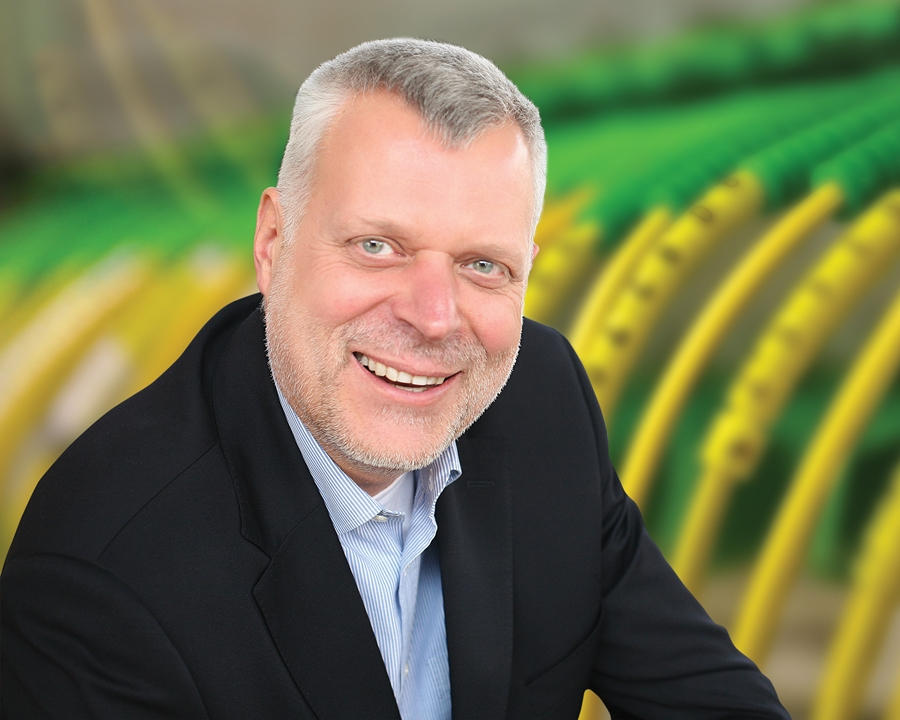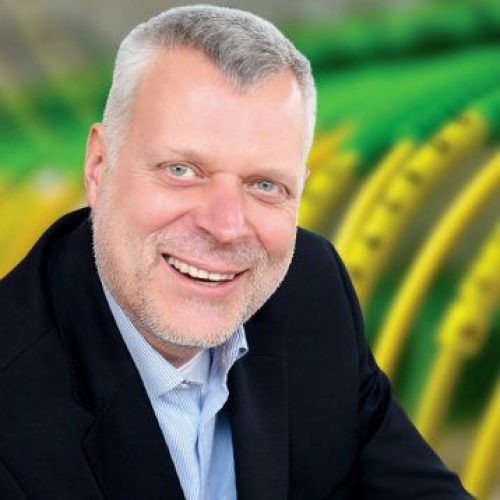Vision of changes
The energy market in which EWE Polska Group operates is conditioned, among others, by the law. This and many internal regulations that are typical of large international corporations constitute the framework which limits local companies. Naturally, this has influence on the functioning of IT systems and, consequently, requires companies to choose between the benefits of the centralization of the environment at the corporate level (consistent standards), and the benefits of local system management (greater flexibility and possibility to better adapt to the working environment).
In 2012, after several years of operation in a centralized corporate IT model, with the increase in business scale, EWE Polska took a strategic decision to consider the need for an alternative model, giving a greater autonomy in the area of IT. The overall objective of the considered change was to improve customer service and internal processes, while maintaining the existing very high system management and information security standards of the Group, and to ensure the long-term cost-effectiveness.
BCC (now All for One Poland) became the partner of EWE in the implementation of this complex project already in the conceptual phase.
Business Blueprint
The business blueprint phase began in October 2012. During the next year, a team composed of employees of the EWE Polska Group, German EWE AG companies and BCC consultants conducted a thorough analysis of the use of IT tools in Polish EWE companies.
The key objectives of the business blueprint included:
- Increasing the role of the IT Department in EWE Polska as an internal partner and advisor in choosing the best business solutions
- A dominant role of outsourcing in the system maintenance and ICT services separated from corporate structures
- Optimization of business processes by using new, adjusted IT tools
- Maximising the system availability and maintaining the continuity of business during the project
- Maintaining the highest security requirements that are in force in the Group.
The first stage of works consisted in a very detailed technical audit, the purpose of which was to inventory IT systems and dependencies between them, and to determine their validity from a business perspective.
In the second stage, potential architectures of the target environment for each of the areas were outlined, with – where justified – two or three alternatives to choose from at a later time.
The final stage of the business blueprint phase was to plan the scenarios for the migration from the current state to the proposed target state, taking into account the budget and work schedule.
Months of work of the team consisting of more than ten persons resulted in a very thorough analysis of the existing IT environment and the feasibility study for the separation project, confirmed by a positive opinion of German and Polish experts on technical feasibility of the project implementation. Reaching a consistent, comprehensive project required the analysis of many potential alternatives and the introduction of many changes.
The document developed and refined in this way was then subjected to detailed verification by executives of both EWE AG and EWE Polska. The Business Blueprint in its final form was approved for implementation in December 2013, which initiated the unique undertaking in the history of EWE Group to separate the IT environment.
Realization – parallel activities
The conditions under which the project was executed caused that the realization phase had to be executed in just four months. The schedule adjusted to that restriction enforced the parallel execution of implementation tasks and provided for the minimum time reserve for dealing with the consequences of unforeseen events.
In accordance with the plan, to maintain business continuity, works had to be conducted on a mirrored network infrastructure during a transition period, and individual systems and user groups had to be transferred seamlessly to the target environment.
The first and basic element, which was the precondition for executing works in other areas, was to provide the communication infrastructure – the internal LAN network in all six offices of EWE Polska, connections between branches, connections to EWE AG, connections to the data center, and Internet access. The task was executed entirely by BCC consultants, using optical fibres of EWE Polska, as well as leased lines provided by telecommunication operators. Network solutions of Juniper Networks were used.
At the same time, the implementation team responsible for the area of Microsoft Active Directory built a test environment, allowing for the preparation of standard security policies, domain groups and authorizations to network resources, etc. The conducted configuration works on the one hand followed on from the current model used in the Group, and on the other hand, allowed for a more flexible structure and its adjustment to the requirements of EWE Polska. A close cooperation between the IT Department of EWE Polska and BCC consultants allowed for translating business needs presented in the descriptive way into specific settings in the system configuration. Solutions implemented in the test and development environment were then transferred to the target production systems.
In parallel, template images of workstations were prepared and tested, and at a later stage of the project they were used as templates for the re-installation of the working environment on the previously operated computers. The combination of several different types of hardware and sets of applications (adapted to the requirements of each work center) shows the complexity and effort required to build and verify the template image. Particular emphasis was placed on the security of data processed in EWE and preventing its leakage. Also, the printer and scanner settings were changed, integrating them in the new environment of workstations.
Workstations, telephony, video conferencing
The workstation area was one of the elements of the separation project, which had the greatest impact on EWE Polska employees. The interface was totally changed – primarily the operating system language (Polish instead of German), but also the Windows itself – separation was in fact an excellent opportunity to upgrade Windows. Care was taken to ensure that the way of handling individual applications and IT tools (e-mail, access to network resources or specialized systems) remained as much as possible the same.

Mariusz Radosh, IT & TK Director in EWE Polska
More flexible IT infrastructure
The choice of BCC (now All for One Poland) as the project contractor was determined by the course of previous cooperation including hosting and administration of key IT systems for customer management, such as gas telemetry and billing systems. During that cooperation we became convinced that BCC guarantees the high level of services and a restrictive security policy within the data confidentiality area.
The biggest challenge in the project was cultural differences and strict application of security procedures and policies by the corporation. What seemed to be simple to implement from the point of view of technology, appeared to be a great problem due to the need to act in accordance with corporate rules. This complicated the project very much and posed a challenge in places where we totally did not expect it.
The multidimensionality of the project, which included issues, such as LAN / WAN, server, workstations, applications as well as the area of telephone and video conferencing, caused that its coordination on the part of the Group in Germany required involvement of various specialists from internal companies and third parties. In such a large Group it was a really big challenge. But it ended with success!
The management of the IT infrastructure in Poland has now become much more flexible – we are no longer a small part of the huge and inert body, which is the IT system of the Group, but we became an independent unit. This is the result of intensive efforts of the Management Board of EWE Polska to get more competitive advantage in the Polish market. New possibilities for deployments of Polish applications open up, which we carefully use. For EWE, the opening of the gas and electricity market is the great potential for development in the Polish market and IT wants to actively support this activity.
In our geographically distributed structure, with the growing availability of high-throughput connections, hosting, administration and helpdesk in the outsourcing model is the most optimal solution. The internal IT staff can focus on immediate business needs in terms of IT, and put the administration of the central infrastructure in good hands. It allows optimization of costs and increase IT effectiveness. In a small IT team, it is difficult to gather expertise in such a wide range of needs of modern technology. Outsourcing is really the only solution!
The most noticeable benefit of the reorganization of IT for the user is the increase of the flexibility and responsiveness of IT services to the business needs. Applications are no more forwarded to the IT headquarters in Germany, but are implemented by local IT services in collaboration with BCC. The response time to meet our needs is shorter, the computer has become a friendlier working tool, and newly implemented applications will improve the service of our customers, what we care most about.
Mariusz Radosh, IT & TK Director in EWE Polska
One of project elements was proper communication of changes to employees as well as conducting on-the-job training courses. Their goal was to facilitate the work in the new IT environment. As a result, these changes, although significant, were readily accepted by EWE Polska employees.
Because of its independence of other project areas, the implementation of a new telephone and video conferencing system was executed in background. Before, these services had been handled entirely by the Group employees, and it was decided within the isolation project to outsource them to external providers. This allowed, in particular, for a flexible management of telecommunication services, better adjustment of solutions to the specific needs of EWE Polska, and at the same time a significant reduction in maintenance costs. In the context of technology, it is worth noting that the traditional PBX was abandoned for a virtual solution – VPBX.
After more than two months of intensive preparatory work, not affecting directly the current functioning of the organization, a new production system environment was installed, configured and ready. With the completion of tests of template workstations, a transitional phase was commenced, in which user computers were gradually replaced so as to ensure, using the remote work technology, uninterrupted access of employees from Poland to the central systems that were still operated in Germany. With the full involvement of EWE Polska, the task to change workstations of all employees in all branches was completed in a record time of less than two weeks, and the average time of unavailability of a computer at a workplace was only approx. 1,5 hours.
Go-live
The culmination of the project was the weekend when the infrastructure was finally separated. The goal of executed tasks in those days was a physical transfer of data from Germany to Poland. They were planned with the accuracy of one minute, and most of the required activities were tested previously to identify potential problems and to determine their duration as accurately as possible. The approval of readiness to migrate data required the Polish and German side to confirm a check-list consisting of dozens of items.
The data import that was largely automated, as well as the transition of EWE Polska to new Polish production systems, ran better than planned. Downtimes of critical systems lasted minutes, while downtimes of the systems needed only during office business hours were narrowed down to non-working days.
Monday after the “go-live weekend" – 14 weeks after the commencement of the realization phase – was the first day of work of EWE Polska in the IT environment separated from corporate structures. Full support and readiness to respond to issues was ensured both by EWE IT Department and the BCC team. The minimum number of requests was the best confirmation of a correctly executed migration. In the following days, additional minor changes were made to optimize the functioning of the systems already operating at full workload.
The complement to the project and an important innovation for the EWE Polska Group was also a transfer of selected internal business processes of the organization for the BeeOffice platform. In the EWE Polska Group, the Software as a Service organizes and streamlines the IT license management, reservation of company resources, records of equipment and employee requirements.
As emphasized by Mariusz Radosh, IT & TK Director in EWE Polska: „The standard BeeOffice provides rich functionality that may be flexibly adjusted to different needs and processes. An additional value is the possibility to run completely new functions. Especially for us, the solution was prepared for managing work schedules."
The last few weeks of the project were spent on decommissioning of the elements of the previously operated infrastructure and elimination of the support of corporate IT services for the EWE Polska Group.
BeeOffice in EWE – friendly employee self-service
Reorganization of the company is a good moment to consider how you can improve planned or already operational business processes. Such a situation occurred in EWE, which decided to automate part of the processes so that IT tools could best meet the needs of managers and employees. The idea of using BeeOffice arose from the real need for IT license management. In the next steps, other system modules were launched, such as business trip settlement, leave requests, company car management, and equipment management.
The common feature of all BeeOffice deployments is shortening the distance between end users and IT systems, providing employees with part of the functions previously carried out only by specialists in a given field. This advantage is best noticeable in the area of leave requests: employees can at any time check the available leave quota and submit a leave request, even while at home and using a smartphone, without the involvement of a Human Resources employee. The supervisor is notified of a new request electronically and can accept it even when staying outside the company office. HR departments receive the information on leave requests approved by supervisors immediately, and not only when their paper versions reach the branches of the company, as it was previously.
Typically, time and cost savings of the company are associated with the limitation of “pleasant" aspects of work, but with a larger number of tasks for individuals. However, modern self-service solutions supporting the daily work are appreciated both by individual employees, financial and HR specialists, and managers They save time of all those people, provide insight into current and accurate information, and as a result reduce your costs.
Jakub Żurek, Sales Manager, All for One Poland
Hosting, helpdesk, private cloud
The executed project was a significant challenge both for EWE and BCC. The final success was due to a great commitment of the Polish and German staff and partnership of all task teams, whose expert knowledge allowed to plan and then carry out all planned changes. Despite high complexity, the project was implemented in accordance with the schedule and budget prescribed in the business blueprint, and business benefits that were included in primary objectives are already noticeable by EWE.
EWE Polska Group, after completion of the IT separation project, extended the existing cooperation with All for One Data Centers with the hosting and management of central IT systems. Within the framework of the private cloud provided by BCC, EWE has a pool of virtualized hardware resources, allowing for the flexible configuration and making changes corresponding to the current business needs. Among the key systems of EWE Polska Group maintained in this architecture are office systems, a groupware platform, an internal request submission portal, but also critical systems related to the operation of the gas network – the billing and telemetry systems.
In addition, as part of the contract, the All for One Outsourcing Center also provides the network infrastructure management services and ensures the second line of support (IT helpdesk) for EWE Polska users.


